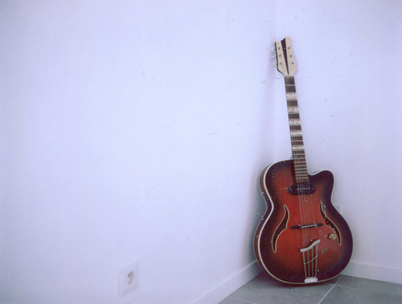How to Improve Your Playing Without a Guitar in Your Hands
All the latest guitar news, interviews, lessons, reviews, deals and more, direct to your inbox!
You are now subscribed
Your newsletter sign-up was successful

In my last column, I discussed some ways that you could deal with so-called "tedious" practice.
This term can mean different things to different people. In particular, I was talking about that initial and often uncomfortable moment when your fingers are learning to play something new.
At that early stage, it's too difficult to have fun with the pattern or lick in question, so you play it (ad nauseam) until it becomes second nature. This highlights the process of improving one's muscle memory.
After that column was finished, I started thinking about the very concept of practice itself. If you can make some noticeable improvements with your physical chops by passively practicing (perhaps while watching TV), can you sharpen your mental chops without a guitar in your hands? Absolutely.
There are only so many hours in a day, and most people don't have access to a guitar for a good portion of that time. But that doesn't disqualify the average person from becoming a great musician. What can you do to actively "practice" while you're driving in your car, riding on the subway, stuck on an airplane, at the gym or on your lunch break?
First, we can use technology to our advantage instead of playing random cell phone games. Most of the devices we carry in our pockets have immediate access to more information than heads of state had only a few decades ago. Let's make a list of the best ways you can practice when you're away from the six string.
Learning Music Theory
All the latest guitar news, interviews, lessons, reviews, deals and more, direct to your inbox!
When you think about it, the main objective of music theory is to fully explain the concepts behind chord construction and how that logically connects with intervals, scales and modes. Once you grasp these concepts, it's advisable to memorize them so you're not constantly referring back to various websites.
This is the first step before you can apply any of your new-found knowledge in a musical scenario. So you really don't need to have a guitar around when you're acclimating to this new information. All you need is a phone or tablet and a decent website or app with reliable information (I have a thorough explanation of music theory basics at my website broken into Part 1 and Part 2).
Memorizing the Notes on the Fretboard
Let's say you only have an hour (maybe two) in an average day to sit down and play your guitar. Do you really want to spend the first 20 minutes trying to memorize notes like you're studying for an exam? I didn't think so. It's better to spend those 20 minutes warming up your hands.
Memorizing the notes can be carried out by using an app on your phone or tablet. This way, you don't feel the pressure of "studying" the notes. Instead, just casually look at the app whenever you have a few minutes to spare during the day. After a while, you'll realize how comfortable you are with the fretboard.
Learning Rhythm Notation
Again, this is an activity you can engage in without a large and bulky book. Just download an app and become familiar with basic rhythmic divisions (whole note, half note, quarter note, etc.). Even if sight reading isn't an ultimate goal of yours, it never hurts to be able to read some basic notation.
Watching Videos
Instead of watching some viral YouTube video that probably won't enrich your life in any way, watch a video of a great guitarist that will inspire you to practice harder. It's funny how a five-minute video can totally shift your perspective and motivate you to learn new things.
Actively Listening to All Styles of Music
This might be the most underrated aspect of becoming a well-rounded musician. The key word here is "actively." In today's world, we have music playing all the time. You can let your iTunes library play in shuffle mode for hours on end. But how often are we only listening to music? No reading, no playing video games, just fully enamored with whatever song is playing?
This is especially beneficial if you're trying to get into different genres of music. A rock guitarist might get into jazz by simply playing "2-5-1" progressions and practicing some jazz-oriented scales. On the surface, this might make him or her feel like they know how to play jazz. But I'm sure a seasoned jazz player would disagree.
Put down the guitar and listen to some great jazz music. Obviously, the same goes for any style (country, blues, classical, etc.). This will take you much farther than memorizing a few finger patterns.
There you have it, you can accomplish a great deal without having a guitar anywhere near you. Take advantage of any free time you have and use it wisely!
Chris Breen is a New Jersey-based guitarist with 14 years of experience under his belt. He, along with his brother Jon (on drums) started the two-piece metal project known as SCARSIC in 2011. They've recently been joined by bassist Bill Loucas and have released an album, A Tale of Two Worlds (available on iTunes, Amazon and Spotify). Chris also is part of an all-acoustic side project called Eyes Turn Stone. Chris teaches guitar lessons (in person or via Skype). For more information, visit BreenMusicLessons.com.
